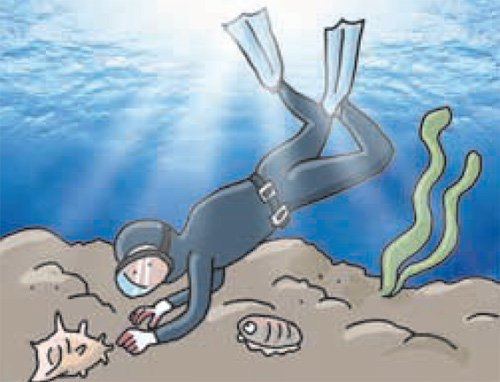The mermaids on Songdo Beach
The mermaids on Songdo Beach
Posted March. 27, 2020 07:34,
Updated March. 27, 2020 07:34

“My four sisters were all divers. Mother was always in the sea, and she rubbed it off on them. During the late teen years, they began to leave our hometown to make a living in the waters. They would leave around late February and come back to Jeju after Thanksgiving holidays. It was my sisters that provided our family with the money they earned from gathering seafood across the country. The youngest and second youngest sisters are well into their 70s now, but they are still diving. It pains my heart whenever I think of my sisters.”
The voice of the 70-year-old man surnamed Ko was shaking as he cleared his conscience. He still feels indebted to his sisters. He could have not properly studied had it not been for their sacrifice, said the elderly man. Hailing from a small town called Gujwa on Jeju Island, Ko moved to Busan when he became police officer and lived there for 40 years.
In the 1950s and 70s, many female divers, or haenyeos from Jeju, were the breadwinners of their family just like Ko’s sisters. They were typically between late teens and mid-20s. Thousands of haenyeos married men on land and settled there during this period. Leaving home to make a living became a mode of life for those female divers after 1910. Seafood were depleted in the waters off Jeju as Japan’s overfishing went on for a while; furthermore, commercialization of seafood and development maritime transportations meant that there was cash to be made out there, on the other parts of the peninsula.
This journalist visited the Songdo Beach in Busan City to meet female divers coming from the same hometown as Ko’s. Songdo was the country’s first beach to open, which was in 1913. The divers were having talks, sitting near a small port placed between the beach and a national geopark called Amnam.
An 80-year-old woman surnamed Oh comes from a small village called Hado-ri in Gujwa Town. She said she settled in Songdo after working for years around the country to feed her family. “I have four sons. You know how teachers ask them about their parents’ job. Only one wrote down haenyeo, and the other three handed it in blank. It was something of a taboo back then,” says Oh. “Now I am 80, so there is nothing else I can do to make a living. I swim like fish in the water. You see my friend over there, she is 83, but she turns into a mermaid when in the water.” Another haenyeo surnamed Park started diving at 17 and hasn’t stopped for 64 years.
Once there were about 100 haenyeos in Songdo Beach, but now only five have been left. It has been 10 years since the five started gathering seafood to sell them together and share the profits. I asked if there is any conflict about splitting the money equally when the work rate would vary. “We are happy now. There is no competition. We just divide them equally,” said Yang, the 66-year-old diver, who is the youngest in the group. A couple of days later, I visited the beach again. They were swimming like dolphins, making the distinctive haenyeo’s whistling. The sea shone with tranquility, and the mermaids were busy diving.







